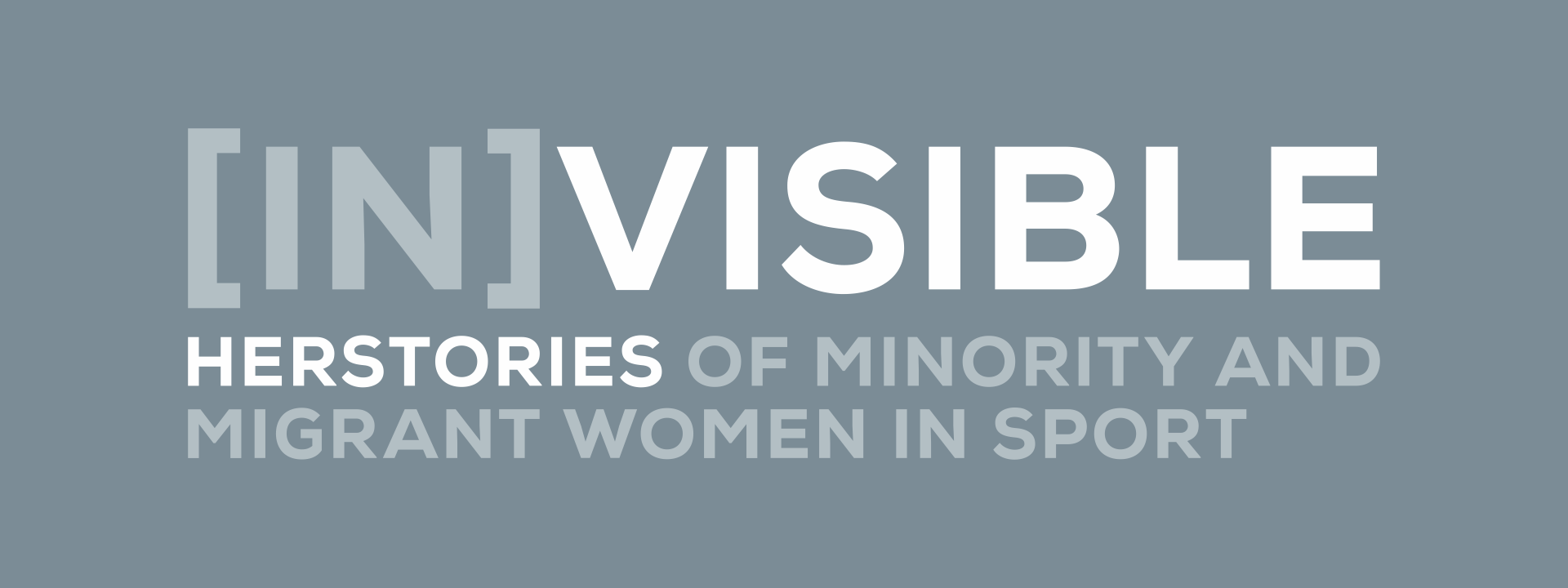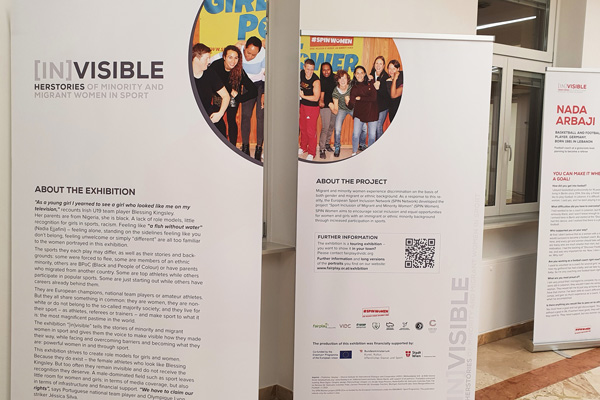Exhibition [in]visible

About the Exhibition
The exhibition “[in]visible” tells the stories of minority and migrant women in sport and gives them the voice to make visible how they made their way, while facing and overcoming barriers and becoming what they are: powerful women in and through sport.
This exhibition strives to create role models for girls and women. Because they do exist – the female athletes who look like Blessing Kingsley. But too often they remain invisible and do not receive the recognition they deserve. A male-dominated field such as sport leaves little room for women and girls: in terms of media coverage, but also in terms of infrastructure and financial support. “We have to claim our rights”, says Portuguese national team player and Olympique Lyon striker Jéssica Silva.

[in]visible – herstories of minority and migrant women in sport – AN INTRODUCTION
“As a young girl I yearned to see a girl who looked like me on my television,” recounts Irish U19 team player Blessing Kingsley. Her parents are from Nigeria, she is black. A lack of role models, little recognition for girls in sports, racism. Feeling like “a fish without water” (Nadia Ejjafini) – feeling alone, standing on the sidelines feeling like you don’t belong, feeling unwelcome or simply “different” are all too familiar to the women portrayed in this exhibition.
The sports they each play may differ, as well as their stories and backgrounds: some were forced to flee, some are members of an ethnic minority, others are BPoC (Black and People of Colour) or have parents who migrated from another country. Some are top athletes while others participate in popular sports. Some are just starting out while others have careers already behind them.
They are European champions, national team players or amateur athletes. But they all share something in common: they are women, they are nonwhite or do not belong to the so-called majority society; and they live for their sport – as athletes, referees or trainers – and make sport to what it is: the most magnificent pastime in the world.
The exhibition “[in]visible” tells the stories of minority and migrant women in sport and gives them the voice to make visible how they made their way, while facing and overcoming barriers and becoming what they are: powerful women in and through sport.
This exhibition strives to create role models for girls and women. Because they do exist – the female athletes who look like Blessing Kingsley. But too often they remain invisible and do not receive the recognition they deserve. A male-dominated field such as sport leaves little room for women and girls: in terms of media coverage, but also in terms of infrastructure and financial support. “We have to claim our rights”, says Portuguese national team player and Olympique Lyon striker Jéssica Silva.
It is an issue of equality – “I perform well and should receive the same support” says Liu Jia, the Austrian European Table Tennis Champion. And it is about the power of sport: “Sport has made me strong. Given me selfconfidence”, Helia Mirzaei describes the decisive role sport played in her life.
“[In]visible – Herstories of minority and migrant women in sport” wants to contribute to ensuring that Blessing Kingsley’s wish soon becomes reality: “I really hope that future girls could learn from my story and hopefully be fortunate enough to see a girl that looks like them playing the sport they love.”
About the project:
Migrant and minority women experience discrimination on the basis of both gender and migrant or ethnic background. As a response to this reality, the European Sport Inclusion Network (SPIN Network) developed the project “Sport Inclusion of Migrant and Minority Women” (SPIN Women). SPIN Women aims to encourage social inclusion and equal opportunities for women and girls with an immigrant or ethnic minority background through increased participation in sports.
- Exhibition & booklet – [in]visible – minority and migrant women in sport:
Exhibition Banners
Booklet in German
Booklet in English